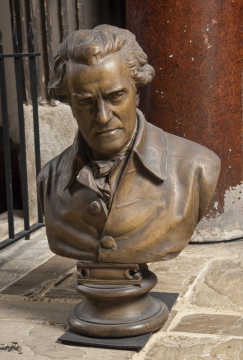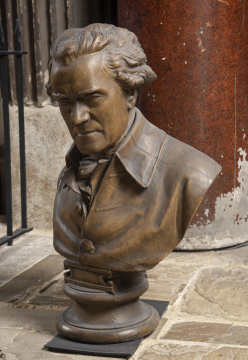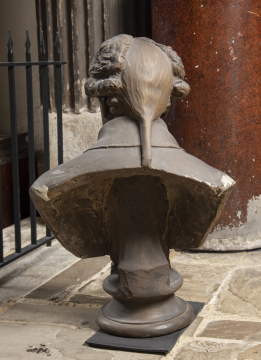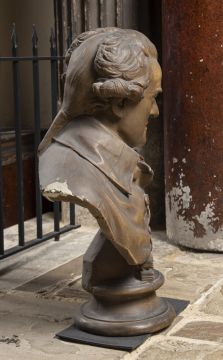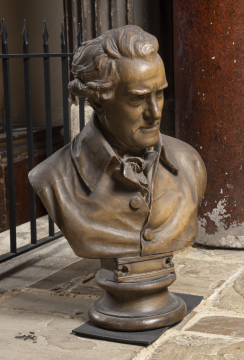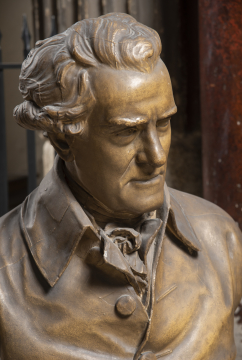Explore Collections


You are here:
CollectionsOnline
/
Cast of a bust of General Paoli (from his monument in Westminster Abbey), 1798
Browse
SM M127. ©Sir John Soane's Museum, London. Photo: Art UK
John Flaxman RA (1755 - 1826), sculptor
Cast of a bust of General Paoli (from his monument in Westminster Abbey), 1798
Plaster cast
Height: 68cm
Width: 48cm
Depth: 28cm
Width: 48cm
Depth: 28cm
Museum number: M127
Not on display
Curatorial note
The celebrated Corsican patriot Pasquale Paoli (1725-1807) has been referred to as the 'Che Guevara of the 18th century'. He was celebrated by Voltaire and Rousseau for producing one of the first republican constitutions of the enlightenment era (the Corsican Constitution ratified in 1755). He spent his later life, from 1795, in permanent exile in London, living in South Audley Street (this is commemorated with a blue plaque on the house).
This plaster is probably a cast of the marble bust executed in Paoli's lifetime and exhibited by Flaxman at the Royal Academy in 1798 (no.1039 A Bust of General Paoli. John Flaxman. A[cademician]).
The marble was later installed as part of the memorial to Paoli in the South Choir Aisle at Westminster Abbey erected following his death in London on 5 February 1807 by permission of the Dean of Westminster. The inscription includes these words:
... To the memory of Pasquale De Paoli, one of the most eminent and most illustrious characters of the age in which he lived. He was born at Rostino, in Corsica, April the 5th 1725, was unanimously chosen, at the age of thirty supreme head of that Island, and died in this metropolis Feb.the 5th 1807, aged 82 years. The early and better part of his life he devoted to the cause of liberty; nobly maintaining it against the usurpation of Genoese and French tyranny: by his many splendid achievements, his useful and benevolent institutions, his patriotic and public zeal manifested upon every occasion, he, amongst the few who have merited so glorious a title, most justly deserved to be hailed the Father of his country. Being obliged by the superior forces of his enemies to retire from Corsica, he sought refuge in this land of liberty; and was here most graciously received ... into the protection of his Majesty King George the Third: by whose fostering hand and munificence, he not only obtained a safe and honourable asylum, but was enabled during the remainder of his days, to enjoy the society of his friends and faithful followers, in affluent and dignified retirement. He expressed to the last moment of his life the most grateful sense of His Majesty's paternal goodness towards him ...'.
The Scottish author James Boswell made his name with a biography of Paoli before going on to form his celebrated association with Dr. Johnson.
In his native Corsica Paoli's life is commemorated at the Musée Pasquale Paoli at Morosaglia.
This plaster is probably a cast of the marble bust executed in Paoli's lifetime and exhibited by Flaxman at the Royal Academy in 1798 (no.1039 A Bust of General Paoli. John Flaxman. A[cademician]).
The marble was later installed as part of the memorial to Paoli in the South Choir Aisle at Westminster Abbey erected following his death in London on 5 February 1807 by permission of the Dean of Westminster. The inscription includes these words:
... To the memory of Pasquale De Paoli, one of the most eminent and most illustrious characters of the age in which he lived. He was born at Rostino, in Corsica, April the 5th 1725, was unanimously chosen, at the age of thirty supreme head of that Island, and died in this metropolis Feb.the 5th 1807, aged 82 years. The early and better part of his life he devoted to the cause of liberty; nobly maintaining it against the usurpation of Genoese and French tyranny: by his many splendid achievements, his useful and benevolent institutions, his patriotic and public zeal manifested upon every occasion, he, amongst the few who have merited so glorious a title, most justly deserved to be hailed the Father of his country. Being obliged by the superior forces of his enemies to retire from Corsica, he sought refuge in this land of liberty; and was here most graciously received ... into the protection of his Majesty King George the Third: by whose fostering hand and munificence, he not only obtained a safe and honourable asylum, but was enabled during the remainder of his days, to enjoy the society of his friends and faithful followers, in affluent and dignified retirement. He expressed to the last moment of his life the most grateful sense of His Majesty's paternal goodness towards him ...'.
The Scottish author James Boswell made his name with a biography of Paoli before going on to form his celebrated association with Dr. Johnson.
In his native Corsica Paoli's life is commemorated at the Musée Pasquale Paoli at Morosaglia.
Literature
Helen Dorey ‘Soane and Flaxman’ in Flaxman: Master of the Purest Line, Exhibition Catalogue, Sir John Soane’s Museum 2003
James Boswell, An account of Corsica..and memoir of Pasquale Paoli, 1769
Peter A. Thrasher "Pasquale Paoli, an enlightened hero", London, 1970
James Boswell, An account of Corsica..and memoir of Pasquale Paoli, 1769
Peter A. Thrasher "Pasquale Paoli, an enlightened hero", London, 1970
Soane collections online is being continually updated. If you wish to find out more or if you have any further information about this object please contact us: worksofart@soane.org.uk
